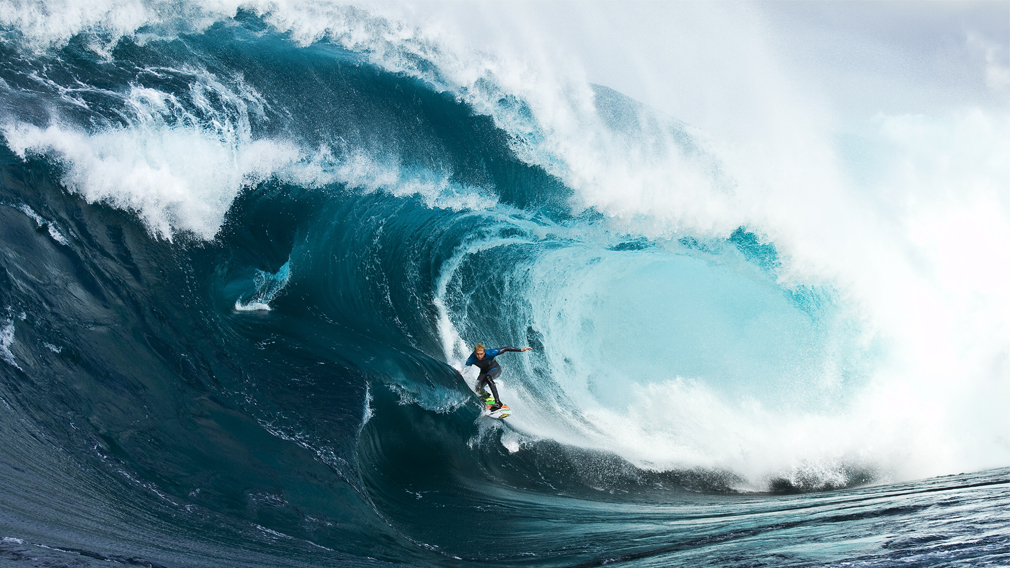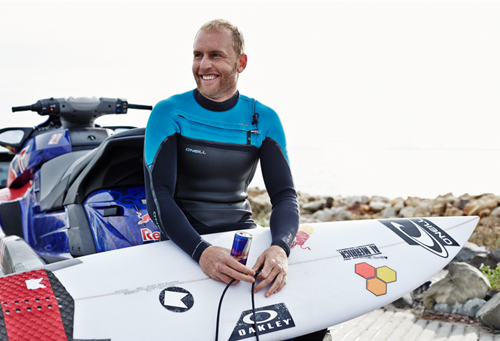What big wave surfing has taught me about facing fear

Pro big wave surfer Mark Mathews has spent many years figuring out how to deal with fear. (Andrew Chisholm)
People who’ve seen me surfing down monster waves the size of mountains usually think I’m likely to be one of three things.
They think I’m crazy; have a death wish; or – my favourite – that I was born with a defect that stops me feeling fear.
But it couldn’t be further from the truth.
I feel fear, nerves and anxiety just like everyone else.
In fact, I was so terrified of the ocean when I was a little boy that my mum used to have to paddle out on her boogie board and rescue me, right into my early teenage years. Pretty embarrassing in front of your mates.

Mark Mathews (supplied)
I’ve spent many years figuring out how to deal with my personal fears.
And what I’ve come to realise is that it really doesn’t matter what your fear is – whether it’s public speaking, heights or spiders, or how your fears compare to other people’s. All that really matters is if those fears are holding you back from something special in your life – in your career, relationships or health.
If it is, then it’s worth facing.
I’ve found the key is to build skills that allow you to master your environment and tame the fear.
That's what I did over decades in surfing. Obsessive training, research and preparation helped me master the ocean as best I could, letting me do the thing that, although it terrified me, I wanted most.
It’s not easy. When you take on a fear or any big challenge you are bound to fail at some point. There’s no two ways about it. That makes the ability to bounce back from failures and push through adversity such an important part of dealing with fear.
While I’ve had my fair share of adversities – injuries and near misses – I’d never faced such a mammoth battle – or learnt such a valuable lesson about conquering fear – as I did in 2016.
I was on a surf trip for my major sponsor, Red Bull.
The very first wave I caught on this trip was not even a particularly big one. But I could see it was going to “close out” and I had to get off it, to avoid a shallow reef in its impact zone. So, like I’ve done 1000 times before, I dove off my board to get underwater to let the wave pass so I could swim to safety.
This time I wasn’t so lucky.
The wave grabbed me, pulled me back and smashed me down onto the reef.
I landed with all my weight on one leg and the power of the wave broke down on my back, compressing me into the reef. I felt blinding pain in my leg as I was rolled around underwater by the wave.
I slipped out of consciousness from the pain, but, luckily, my jet ski safety team pulled me to safety.
Mark Mathews sharing his story as a wellbeing event for Westpac employees.
My next memory is waking up the following day in hospital, a surgeon next to me to give me the news.
The impact with the reef had snapped every ligament that held my knee joint together, torn through the major arteries in my leg that supply my foot with blood, severed the major nerves that control my foot.
He said, “Mark, the good news is we managed to save your leg”.
But then: “You’ve done so much damage to the major nerves that there was nothing we could do to repair them. You’re never going to be able to use your foot again, or surf again.”
Hearing that sent me spiralling into a deep hole of depression, knowing everything I’d worked for in my career was gone in the blink of an eye.
I was so full of anger, frustration and self-pity, and didn’t want to see anyone, not friends or family.
My leg wounds became infected, getting so bad the surgeons were considering amputation.
Right when I’d hit rock bottom, out of the blue I got this message from a young guy called Jason. He happened to be in the same hospital, said he’d followed my surf career, heard about my accident, and asked if we could meet.
Despite me not wanting to see anyone, my wife secretly said yes to Jason.
A few hours later he was wheeled into my room – and everything changed.
Just three months before my injury, Jason had finished school, went snowboarding, slipped on the ice and broke his neck. Complete quadriplegic. He held out his hand as best as he could to shake mine, this young kid dealing with his situation with a smile on his face, with so much courage.
It completely shifted my mindset.
I went from being so full of dark self-pity to being overcome with gratitude, feeling like the luckiest person alive.
To the absolute surprise of the doctors, the infections in my leg started to heal.
The physical turnaround was so unexpected, it prompted me to look up the science of gratitude, and the links between physical health and gratitude were pretty clear. So, I made it my main goal, no matter how painful or bad things got through my recovery, to feel gratitude as many times I could each day.
During that time, the doctors were managing my expectations, focusing me on a life without surfing.
It felt so good to prove them wrong.
After believing I would never surf again, and 18 months of intense rehab and mastering my fears all over again, I was able to get back onto the waves.
What’s more amazing, Jason, who’s become a close friend, has also defied all predictions.
With the help of his brother and his best mates he has managed to get back out into the surf and ride some waves again himself. The courage Jason showed to ride waves, and seeing his exhilaration, has been my biggest motivator, pushing me to get myself back to where I am today, at about 60 per cent of my pre-injury surfing ability, enough to ride big waves again and get my career back on track.
Jason epitomises the mentality that as long as you want something more than you fear it, nothing will get in your way.
We all have different fears, even extreme action sports people, and taking on those fears can be tough.
Failure and adversity are always part of the ride, but when you do fail, or you are faced with adversity, if you can reset your perspective and feel that gratitude, that is the best place to mount a comeback from.
This is an edited transcript of a recent presentation on resilience and conquering fear Mark Mathews gave to Westpac employees.

